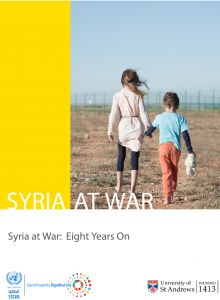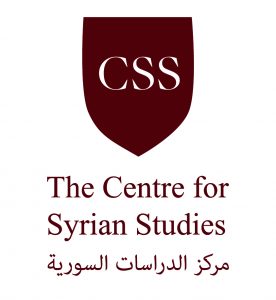Welcome
The Centre for Syrian Studies (CSS) aims to foster scholarship and dialogue about Syria and exchanges between Syrian and British scholars and others. It undertakes research on recent and contemporary Syria, contributes to the training of Syrian scholars, and seeks to compile and disseminate information on Syria expressive of a plurality of viewpoints. Toward these ends, the CSS publishes books and reports; an online, open-access, peer-reviewed journal; Syria Blog where CSS affiliated scholars share regular analysis of the evolving situation in Syria; and an e-library where studies by our scholars are archived.
Special Announcements and Posts
The Centre for Syrian Studies is pleased to announce the publication of Vol 15, No 2 of Syria Studies, the Centre’s online journal, under the title, From Governance to Refugees
This issue contains articles spanning the spectrum from Syria’s pre-2011 politics and governance to the role and impact of refugees during the Syrian Uprising. First, Ahmad Mamoun explores the role of the military in politics in the 1954-58 period, when there was a unique interaction—a duality of power–between military activism and semi-democratic politics in the country. This paper provides an exceptionally rich insight into the complexities of Syrian politics. Equally nuanced is the penetrating analysis by Armenak Tokmajyan of “authoritarian conflict management” i.e. the “mechanisms of domination” deployed by the Syrian Ba’th regime, which he shows to be a subtle combination of threat of violence, co-optation and use of local intermediaries. In the third contribution, Line Khatib insightfully analyses how the regime has sharply centralized and institutionalized its mechanisms of control over the Sunni religious field since the Uprising and Iranian intervention. In their illuminating paper, Umut Ozkaleli and Sean Byrne examine opposition governance under Local Councils and the Syrian Interim Government through the lens of the perceptions of Syrian refugees of their performance. Finally, Ahmad Barakat continues the focus on refugees, specifically ably critiquing perceptions in Europe of security risk from them by looking at the experience of Syrian refugees in Germany.
Access at:
https://ojs.st-andrews.ac.uk/
Call For Papers
Syria Studies special issue: “Feminism in Syria; A critical approach towards Women’s Movements”
Women’s movements mushroomed in the post-2011 Syria and like everything else, feminism in Syria seems to have undergone a radical change. In this period of major transitions, it is crucial to critically examine the evolution of feminist thought(s) and to also explore women’s movements from different theoretical angles that are not limited to feminist theories. This issue engages with multiple historical and contemporary expressions of feminism and women’s agency in Syria, drawing from interdisciplinary and a plurality of theoretical positions.
Syria Studies welcomes submissions to its special issue on feminism in historical and contemporary Syria. In this issue, we encourage interdisciplinary research that is based on empirical work and examine the interplay between theory and practice.
Some of the topics we invite contributors to critically address are decolonising feminism, Islamic feminism, authoritarianism and the instrumentalisation of feminism, the socio-economic variable and feminist evolution, feminism and political representation during conflicts, and the role of women’s movements in reconciliation and desectarianisation.
Please refer to our submission guidelines. As for references we use the author/date reference system, not the footnote.
Abstracts should be submitted to [email protected]
Deadline December 31, 2023
Centre for Syrian Studies is pleased to announce the publication of VOL 15, NO 1 (2023) of Syria Studies on Great Power Competition in the Syrian Conflict
By Raymond Hinnebusch
Muhammad Kanfash
Ferdinand Arslanian
Mohammed Abu Hasan
Dan Wang
Access Issue HERE: https://ojs.st-andrews.ac.uk/index.php/syria/index
In this issue of Syria Studies, we are pleased to share five studies that focus on intervention in the Syrian conflict by the Great Powers. In this era of “great power competition,” Syria has been the target of rival powers seeking to affect outcomes, with, in particular, Russia and China backing the government and the US the opposition.
The first chapter by Raymond Hinnebusch gives an overview of the “New Struggle for Syria” engaging the US, Russia and China, which provides a macro-context for the subsequent studies. It looks at how these powers shaped a proxy war over territorial spheres of influence that metamorphized into an economic struggle waged around US sanctions over reconstruction. The second chapter, by Mohammed Kanfash, conceptualizes sanctions as siege warfare and exposes the humanitarian harm that sanctions have imposed on Syrian civilians. The following study by Ferdinand Arslanian exposes the factors that determine whether sanctions succeeded, as intended, in dissociating the business elites from the regime, namely whether their business activity was mostly domestic or international and their degree of political integration into the regime. In the fourth study, Muhammad Abu Hasan examines how Russia tried to generate soft power in Syria through humanitarian deliveries and instrumentalization of religious networks around the Orthodox church and the Chechen leader, Kadyrov. The last study analyzes why China’s mediation diplomacy in Syria remained low profile—the few national interests at stake, its limited leverage over the parties and the intractability of the conflict. Altogether, the studies provide a multifaceted portrait of the objectives, strategies, and consequences of the intervening powers in the Syrian conflict. They combine meticulous original empirical cast in analytical frameworks that throw welcome new light on the New Struggle for Syria.
Centre for Syrian Studies (CSS) Received the International Relations Research Excellence
We are delighted to share that the CSS received Research Excellence Framework (REF 2021) as world-leading research for its original work on the Syrian War: Helping Governments and International Organizations to Understand and Mitigate the Conflict.
We are grateful for our team of scholars, fellows and students for conducting high-level research.
Over 83% of research carried out by the School of International Relations at the University of St Andrews is world-leading or internationally excellent, according to the results of the Research Excellence Framework (REF 2021) published today (Thursday 12 May).
The REF – a detailed analysis of the research strengths of all UK universities – found that St Andrews excelled in a number of key research areas. Research environment in the School of International Relations was ranked in the top ten in the UK according to REF 2021 data.
Two-thirds of research in the School of International Relations assessed to have impact, with 77 per cent of outputs are internationally recognised
REF found that the overall quality of research at St Andrews had increased by 5.7 % since the last assessment exercise in 2014.
St Andrews Principal and Vice-Chancellor Professor Sally Mapstone FRSE said: “The overall quality of our research has increased significantly since the last REF in 2014, we have cause to celebrate the achievements of several of our Schools whose research is rated amongst the best in the UK, and the fact that over 88% of the research we produce in this small corner of Fife has been held to be world-leading or internationally excellent is a remarkable achievement.”
Although REF itself explicitly does not rank universities according to research strengths, the metrics it produces are widely used in the higher education sector and in the media to benchmark research performance.
According to these figures, using the method of Grade Point Average (GPA), St Andrews was ranked 3rd in Scotland and 28th in the UK, one of six Scottish universities ranked amongst the top 50 research institutions in the UK.
Raymond Hinnebusch and Ola Rifai, Understanding Syria’s Sectarian Wave
E-International relations, May 9, 2021
The sectarian wave that has swept over MENA since the Arab Uprisings has profoundly reshaped regional politics. Syria has become an epicentre of sectarian conflict that has drawn in sectarian actors from without and spilled out over the region. It is therefore a sort of laboratory in which we can explore the dynamics of sectarianism in the region. Understanding the Syrian case requires some engagement with the theoretical debates on sectarianization. The main debate is: to what extent does sectarian identity determine political interests, strategies, alignments and conflicts and to what extent is sectarianization an outcome of these factors? This essay proposes a theoretical framework for understanding this and illustrates it with empirical material from the Syria case.
Access at:
https://www.e-ir.info/2021/05/09/understanding-syrias-sectarian-wave/#google_vignette
November 2021: Council for British Research in the Levant AGM Lecture 2021: Raymond Hinnebusch, The metamorphising struggle for Syria: proxy war, sanctions and stalled reconstruction
Syria’s conflict has metamorphised into a hybrid: a partially frozen proxy war over territory combined with a battle over sanctions and reconstruction. This lecture will explore three aspects of this contest. The lecture will look at the stalemated proxy war; the effort of the regime to use reconstruction to consolidate its power and marginalise opposition and the US effort to obstruct this. At stake is whether Syria’s sovereignty will survive and in what form or whether it’s statehood will further fail, with likely waves of spill-over to neighbours. But Syria is also a test case of the global order: whether the US can use its dominance of the world financial system to sustain its world hegemony or whether its reinvention as a “sanctions hegemon” is the last episode in the transition to a multipolar world.Watch the video by pasting in your browser: https://cbrl.ac.uk/event/metamorphizing-struggle-for-syria/
June 2021
Celebrating the launch of Social Change in Syria: Family, Village and Political Party by Syrian anthropologist Sulayman Khalaf
Moderators: Raymond Hinnebusch and Maria Kastrinou
Dr Sulayman Khalaf’s long-awaited book Social Change in Syria: Family, Village and Political Party (Routledge 2020) is a remarkable anthropological account of social change in a Northern Syrian village in the 20th century. The study, interweaving ethnography and social history, is based on Khalaf’s unpublished (but hugely influential) 1981 PhD thesis, and it has quietly awaited publication for over 40 years. Finally, this work is published, and no doubt it will become indispensable to anyone wishing to understand Syria, but also to the anthropology of the Middle East, and the complex processes of social change.
See the book here: https://www.routledge.com/Social-Change-in-Syria-Family-Village-and-Political-Party/Khalaf/p/book/9780367506261
See video of the session here: https://youtu.be/TYbw75bSWK4
See commentary on the book here:
Click to access Khalaf-Social-Change-in-Syria-Celebration.pdf
June 2021, Report of the research project of CSS Fellow, Dr Tamara al-Om, with the Council of British Research in the Levant:
This project, part of Tamara Al-Omm’s PhD research, aimed at understanding the mechanisms through which Syrian civil society remained active despite the exile and displacement of the majority of its intelligentsia. This research is based on in-depth interviews with Syrian artists, writers, activists, intellectuals and organisations in Beirut and Istanbul. See the full report at:
http://css.wp.st-andrews.ac.uk/files/2021/11/Tamara-al-Om-Coalescence-of-the-displaced-2.docx
December 2020 – Policy Briefs on The Syria at War: Eight Years On Report
The “Syria at War: Eight Years On” report is the second product of the collaboration between the United Nations Economic and Social Commission for Western Asia (ESCWA) and the Centre for Syrian Studies (CSS) at the University of St Andrews. It is the result of extensive research by scholars and experts and benefited from the National Agenda for the Future of Syria (NAFS) Programme’s platform for technical dialogue between a broad spectrum of Syrian stakeholders aimed at moving towards consensus beyond the polarizations of the conflict  period.
period.
Almost a decade of conflict has radically transformed all aspects of Syrian society. The purpose of this report is to trace these transformations at social, economic and governance levels. It provides a framework for moving forward, proposing principles, priorities and pragmatic steps toward an inclusive and sustainable economic recovery and peacebuilding process.



